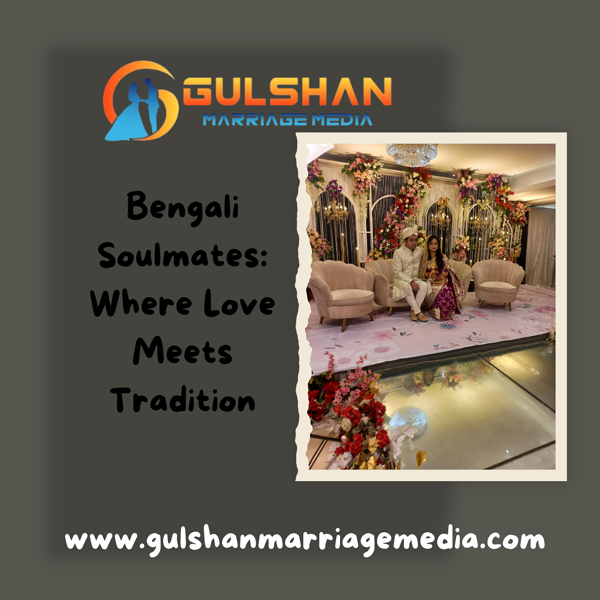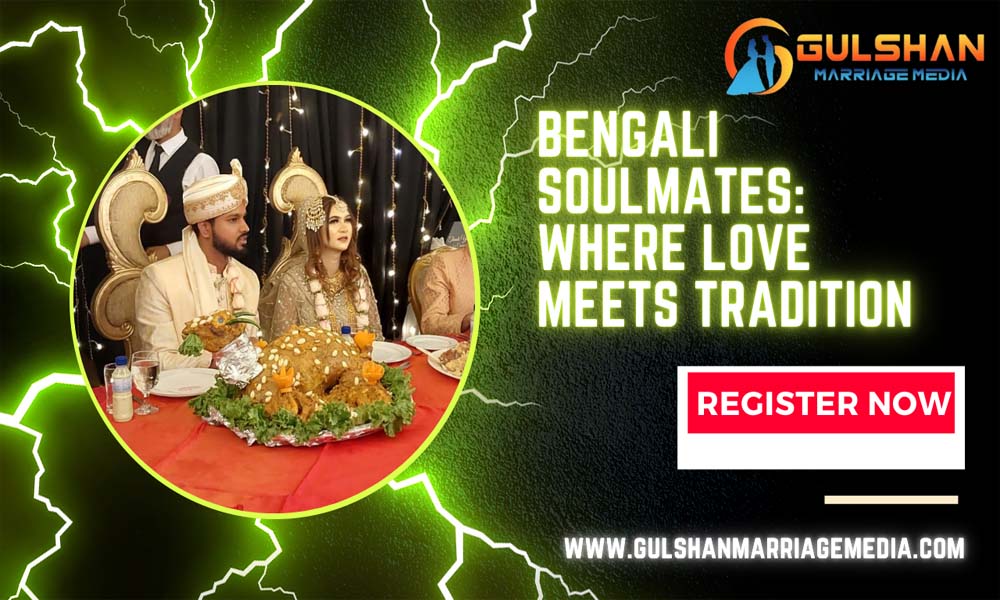Bengali Soulmates: Where Love Meets Tradition on 2025
Introduction
Bengali Soulmates: Marriage is a sacred bond, a union that transcends mere companionship and embraces cultural traditions, familial values, and the aspirations of two souls. In the Bengali community, marriage is not just about two individuals coming together but also about two families uniting in love, trust, and harmony. Bengali weddings are known for their grandeur, deep-rooted customs, and emotional richness. Through the years, while modern influences have shaped relationships, the essence of tradition remains intact.

In this article, we will explore the significance of Bengali marriages, the customs that make them unique, the evolution of matchmaking in the digital age, and how platforms like Bengali Soulmates help individuals find their ideal life partners while preserving cultural values.
The Cultural Essence of Bengali Marriages
Bengali weddings, commonly referred to as “Biye”, are an exquisite blend of rituals, traditions, and festivity. They are deeply embedded in cultural and religious values that have been followed for generations. From the initial matchmaking process to the post-wedding celebrations, every step in a Bengali marriage signifies love, respect, and commitment.
Bengali marriages, known as “Biye,” are a beautiful blend of culture, tradition, and emotions. Unlike conventional unions, Bengali weddings are not just about two individuals but a grand celebration of two families coming together. Every ritual, from Paka Dekha (formal engagement) to Sindoor Daan (sacred commitment), holds deep symbolic meaning. The ceremonies, rich in heritage, reflect the values of love, respect, and unity. The vibrant Gaye Holud (turmeric ceremony), the mesmerizing Saat Paak (seven sacred circles), and the heartfelt Bou Bhat (bride’s first meal at her new home) are just a few highlights of this grand affair. Over time, Bengali marriages have evolved with modern influences, but the essence of tradition remains strong. Whether arranged or love, a Bengali wedding is an emotional and cultural extravaganza, uniting souls and strengthening familial bonds.
1. Matchmaking: The Traditional Ghotok to Modern Matrimony Websites
Traditionally, the matchmaking process in Bengali families was overseen by a “Ghotok” (matchmaker). This person played a crucial role in finding suitable alliances based on family background, caste, education, and financial stability. Parents and elders took the lead in shortlisting prospective brides and grooms while ensuring compatibility in terms of values and traditions.
In the modern era, however, matchmaking has evolved significantly. With the rise of digital platforms, Bengali matrimony websites like Bengali Soulmates have revolutionized the way people find their partners. These platforms allow individuals to take charge of their own search while still respecting traditional matchmaking criteria.
Pre-Wedding Rituals: The Grand Beginning
Bengali weddings are a grand affair, and the pre-wedding rituals set the stage for the auspicious union. These ceremonies are not just about celebration but also about invoking blessings for a harmonious married life. It begins with Aashirbaad, where elders shower the bride and groom with rice, gold, and blessings. Paka Dekha, the formal engagement, marks the official agreement between families. A heartwarming ritual, Aiburo Bhaat, follows, where the bride and groom enjoy their last meal as unmarried individuals, filled with traditional delicacies. On the wedding day, Dodhi Mangal is performed at dawn, where they are fed a meal of curd and rice for prosperity. These rituals, deeply rooted in Bengali culture, signify love, family bonds, and a joyful transition into married life, making the wedding truly special.1. Aashirbaad (Blessings Ceremony)
Before the wedding, elders from both the bride’s and groom’s families bless the couple with rice, gold, and gifts, symbolizing prosperity and happiness.
2. Paka Dekha (Formal Engagement)
In traditional settings, families officially agree upon the marriage in a small gathering, where horoscopes are matched and wedding dates are finalized.
3. Aiburo Bhaat (Last Meal as a Bachelor/Bachelorette)
A cherished tradition where the bride and groom have their last meal as unmarried individuals with their respective families. This meal consists of elaborate Bengali delicacies as a way of celebrating their transition into married life.
4. Dodhi Mangal (Pre-Dawn Ritual)
On the wedding day, the bride and groom are fed a meal consisting of rice and curd by their close family members. This meal is seen as a blessing for a prosperous married life.
The Wedding Ceremony: A Sacred Union
The Bengali wedding ceremony, or Biye, is a sacred and joyous affair, filled with deep-rooted traditions and symbolic rituals. It begins with the Gaye Holud, where turmeric paste is applied to the bride and groom for purification and radiance. As the groom arrives, he is welcomed with conch shells and ululation in the Bor Boron ceremony. The bride, seated on a pidi (wooden stool), is lifted by her brothers and circles the groom seven times in the Saat Paak ritual before their eyes finally meet in Subho Drishti. The couple exchanges garlands in Mala Bodol, signifying acceptance. The wedding is solemnized with Sampradan, where the bride’s father gives her away, and Sindoor Daan, marking her as married. This beautiful fusion of love and tradition unites two souls in an everlasting bond.1. Gaye Holud (Turmeric Ceremony)
Similar to the Haldi ceremony in other Indian weddings, the Gaye Holud is a vibrant event where turmeric paste is applied to the bride and groom, signifying purification and prosperity.
2. Bor Jatri & Bor Boron (Groom’s Arrival)
The groom, dressed in traditional attire and accompanied by his friends and family, arrives at the bride’s house, where he is welcomed with conch shells, ululation, and aarti.
3. Saat Paak & Subho Drishti (Sacred Circling & First Glance)
The bride is seated on a wooden stool (pidi) and is lifted by her brothers, circling the groom seven times before they finally exchange glances, marking their first auspicious meeting.
4. Mala Bodol (Garland Exchange)
The bride and groom exchange garlands, signifying their acceptance of each other.
5. Sampradan & Sindoor Daan (Sacred Commitment)
The bride’s father or guardian gives her away to the groom in the presence of the sacred fire. The wedding is then solemnized with the application of sindoor (vermillion) on the bride’s forehead.
6. Basar Ghar (Post-Wedding Celebration)
Following the wedding, the couple spends time with family members, engaging in fun-filled rituals and blessings.
Post-Wedding Rituals: The New Beginnings
Marriage in Bengali culture is not just about the wedding day; post-wedding rituals hold immense significance.
1. Bashi Biye (Reception Ceremony)
The groom’s family hosts a grand reception to introduce the new bride to their relatives and friends.
2. Bou Bhat (First Meal at Groom’s Home)
The bride prepares her first meal at her new home, symbolizing her integration into the family.
3. Phool Shojja (The Flower Bed Ceremony)
A beautifully decorated room with flowers is prepared for the couple to mark the beginning of their married life.
The Role of Bengali Soulmates in Modern Matchmaking
With changing times, the concept of arranged marriages has evolved, yet the significance of cultural values remains. Matrimonial websites like Bengali Soulmates serve as a bridge between tradition and modernity, allowing individuals to find partners who share their values, aspirations, and lifestyles.
In today’s fast-paced world, Bengali Soulmates plays a vital role in modern matchmaking, blending tradition with technology. While traditional matchmakers (Ghotoks) once facilitated marriages, digital platforms like Bengali Soulmates now empower individuals to find their ideal partners based on compatibility, values, and aspirations. This platform allows users to create detailed profiles, filter preferences, and connect with potential matches while maintaining cultural integrity. Families can still be involved, ensuring that traditional values are respected. With verified profiles, advanced matchmaking algorithms, and a safe environment, Bengali Soulmates makes finding a life partner more accessible and efficient. Whether seeking a partner who upholds traditional Bengali customs or someone who embraces a modern lifestyle, this platform ensures that love and tradition coexist harmoniously, making the journey to marriage both meaningful and convenient.
1. Why Choose Bengali Soulmates?
- Personalized Matches: The platform ensures compatibility through detailed profiles and preference-based filters.
- Cultural Preservation: It prioritizes cultural traditions while incorporating modern matchmaking techniques.
- Verified Profiles: Users can trust the authenticity of profiles, ensuring a safe and secure experience.
- Family Involvement: While individuals have autonomy, families can also play a role in the selection process.
2. How It Works
- Create a Profile: Users provide details about themselves, including background, preferences, and interests.
- Browse & Connect: The platform offers intelligent matchmaking based on compatibility.
- Interact & Decide: Individuals and families communicate before finalizing their choices.
Conclusion: Where Love Meets Tradition
Bengali marriages are a beautiful amalgamation of customs, emotions, and commitments. While the world is moving towards modern matchmaking methods, the values of love, respect, and cultural significance remain unchanged. Bengali Soulmates bridges this gap, allowing individuals to embrace tradition while choosing their ideal partner in a contemporary setting.
Whether you are looking for a soulmate who cherishes traditional values or someone who blends modernity with cultural heritage, Bengali Soulmates is where your journey begins. After all, finding a life partner is not just about compatibility—it is about finding someone who shares your dreams, respects your traditions, and walks with you through the journey of life.


























